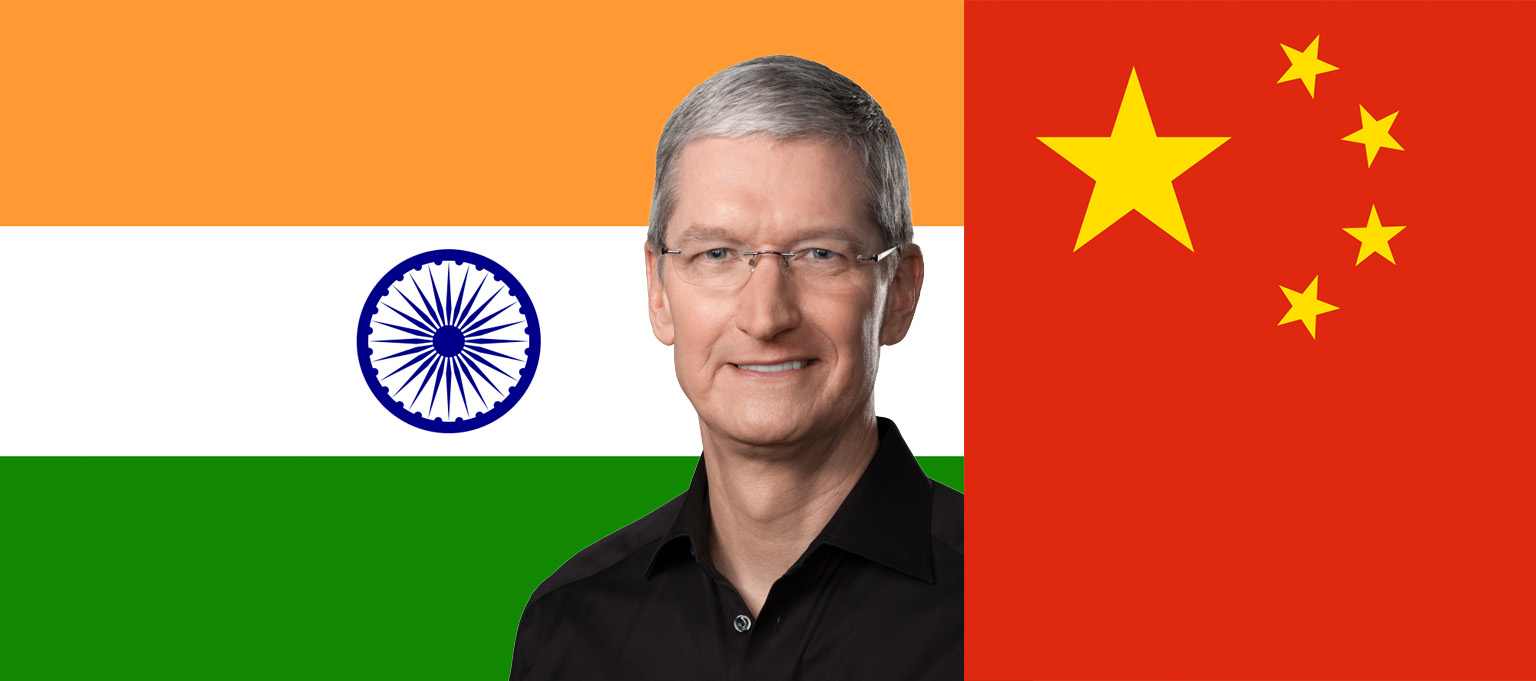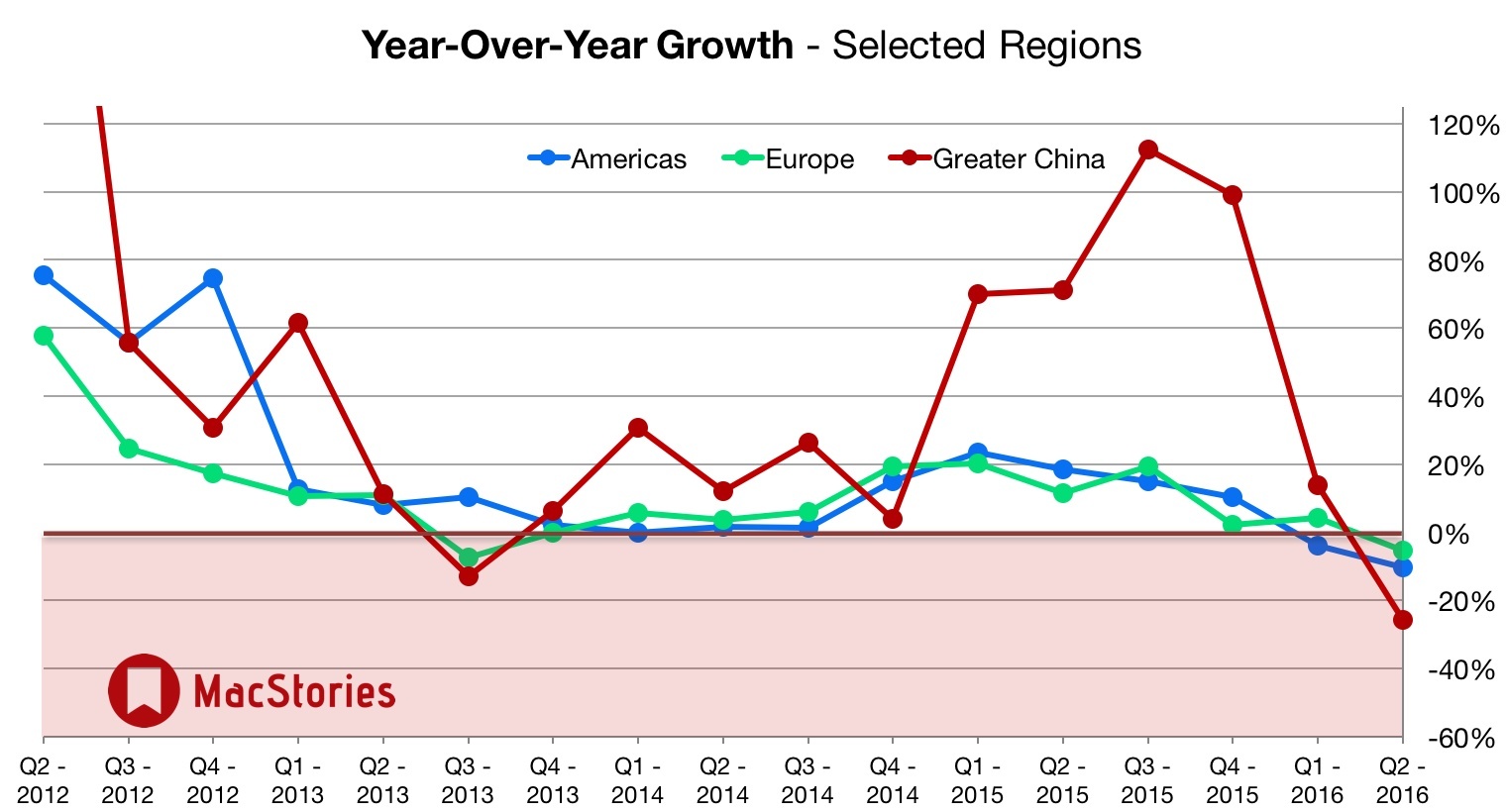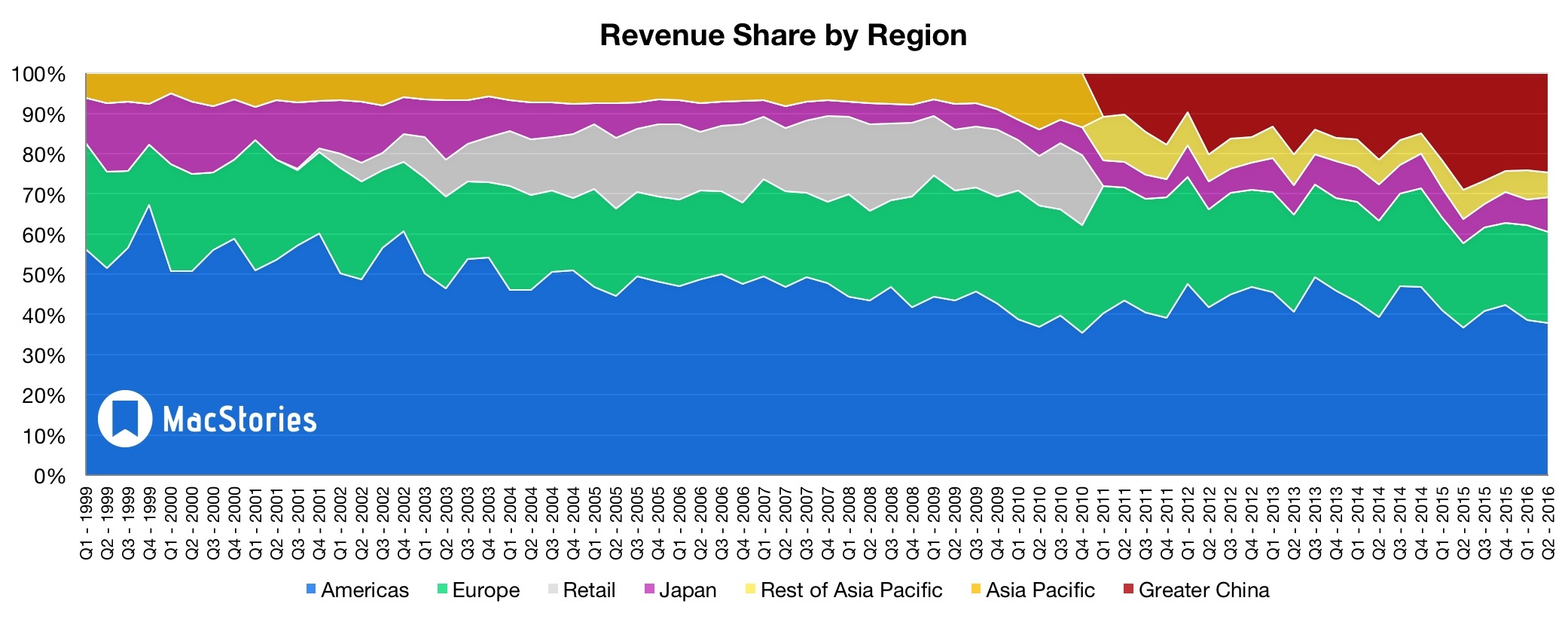It may not have made the front page headlines, but Apple just concluded a significant week-long tour of India and China. Tim Cook has made numerous trips to China in recent years, but this was the first time that Cook visited India on an official trip as CEO of Apple. The trip also comes at a crucial time for the company as it begins to make big strategic moves to attract more Indian consumers, and at a time when Apple’s growth in China last quarter screeched to a halt after a period of huge growth.
Context for the Trip
The significance of the trips is made clear by the context of recent developments in China and India. These developments set the context for why it was important for Apple to make the trip, and also make it public.
China
Poor Earnings Results in China
In late April, Apple reported its Q2 2016 earnings results. It was the first time that Apple’s revenue had declined year-over-year since 2003. The story was particularly grim in Greater China, Apple’s second largest market after the United States, where revenue declined year-over-year by 26%. The decline was made all the more stark after the massive growth Apple experienced in Greater China across late-2014 and 2015.
Since Apple began reporting its revenue in Greater China in 2011, its share of total Apple revenue has grown rapidly from 10% in 2011 to nearly 30% in 2015. In recent quarters it has settled to around 25%, and after last quarter investors are understandably nervous about Apple’s future performance in China. A continued lack of growth, or decline, in China would be devastating to Apple’s financial performance.
During the earnings call Cook attempted to downplay the decline in China, and whilst it does provide context (albeit long-winded), it is still undeniable that Apple’s revenues declined in China (transcript via iMore):
If you take Greater China, we include Taiwan, Hong Kong, and mainland China in the Greater China segment that you see reported on your data sheet. The vast majority of the weakness in the Greater China region was in Hong Kong. And our perspective on that is, it’s a combination of the Hong Kong dollar being pegged at the U.S. Dollar, so it carries the burden of the strength of the U.S. Dollar, and that has driven tourism, international shopping, and trade down significantly compared to what it was in the year-ago. If you look at mainland China, which is one that I am personally very focused on, we’re down 11 percent in mainland China on a reported basis. On a constant currency basis we’re only down 7. And the way that we really look at sort of the health or underlying demand, is look at sell-through, and if you look at it there we were down 5. And keep in mind, that that’s down 5 on a comp a year ago that was up 81. And so as I sort of back up from this and look at the larger picture, I think China is not weak, as has been talked about, I see China as, may not have the wind at our backs that we once did, but it’s a lot more stable than what I think is the common view of it. And so we remain really optimistic on China.
China Shuts Down iTunes Movies and iBooks Store
In mid-April, seemingly out of the blue, China’s government forced Apple to shut down iTunes Movies and the iBooks Store in China. Incredibly, Apple had only opened the iTunes Movies and iBooks Store six months earlier in September 2015. At the time, Apple issued a press release announcing the expansion of the digital content stores into China, and Eddy Cue was quoted as saying:
“Customers in China love the App Store and have made it our largest market in the world for app downloads,” said Eddy Cue, Apple’s senior vice president of Internet Software and Services. “One of the top requests has been more great content and we’re thrilled to bring music, movies and books to China, curated by a local team of experts.”
The FBI and San Bernardino Case
Earlier this year a topic of considerable discussion was Apple’s refusal to assist the FBI in unlocking an iPhone used by one of the San Bernardino shooters. Apple refused on the basis that by developing a custom operating system which disabled security checks, it would compromise the privacy and safety of everyone who owned an iPhone.
It was never at the forefront of the debate, but an important ancillary issue was what would happen in China if Apple did cooperate with the FBI. Apple never explicitly mentioned China, but as pointed out by the Wall Street Journal, it alluded to it in one of their court filings:
Once developed for our government, it is only a matter of time before foreign governments demand the same tool.
Apple’s general counsel, Bruce Sewell, was directly asked about China when he fronted up to a US congressional committee in April. He noted that Chinese authorities have asked Apple for its source code, but went on to say “I want to be very clear on this, we have not provided source code to the Chinese government.”
iPhone Trademark Dispute Loss
In early May, Apple lost a court case over the “iPhone” trademark in respect of leather goods which it has been pursuing since 2012. The Beijing Municipal High People’s Court held that Xintong Tiandi is free to continue to use the phrase “iPhone” on leather goods. The court held that Apple could not prove that the iPhone brand was well-known in China before it started selling the iPhone within China in 2009. Apple told Reuters at the time of the decision that it was disappointed and said that it plans to request a retrial with the Supreme People’s Court.
India
Apple’s Plan to Import & Sell Refurbished iPhones is Rejected
The Indian government, in early May, rejected Apple’s request to import and sell refurbished iPhones in India. Apple had proposed a similar plan in 2015, which was also rejected. There were concerns, stoked by rival firms in India, that Apple’s plan would flood India with used electronics and weaken the Indian government’s “Make-in-India” local manufacturing program.
Apple Retail Stores Likely to Get Key Exemption
Apple Retail Stores are not a done deal in India, but in late April an Indian government panel recommended that Apple be exempted from a key requirement that would prevent them from opening retail stores in India. There are mandatory local sourcing rules in India for single-brand retail stores, but exemptions can be given for products “having state of the art and cutting edge technology and where local sourcing is not possible”. Final approval for the exemption is still required from the Indian Finance Minister.
Update (25 May 2016): India’s finance minister denied the exemption from local sourcing that Apple had requested, overturning the decision in late April described above.
Apple Growing Rapidly in India, with Huge Potential
In the earnings call for Q2 2016, Tim Cook specifically called out the strong growth in India where iPhone sales were up 56% year-over-year. The potential for Apple is enormous in India. It is the third largest market in the world for smartphones and yet within India Apple only has a 2% market share. Tim Cook said as much in the latest earnings call, emphasising the opportunity for Apple (transcript via iMore):
…we’ve been working in India for a couple of years, or more, but we’ve been working with great energy over the last 18 months or so, and I’m encouraged by the results that we’re beginning to see there, and we believe there’s a lot, lot more there. It is already the third-largest smartphone market in the world, but because the smartphones that are working there are low-end primarily because of the network and the economics, the market potential has not been as great there, but I sort of view India is where China was maybe 7-10 years ago, from that point of view. And I think there’s a really great opportunity there.
Modi’s “Make in India” Push
Soon after Narendra Modi became the Prime Minister of India in 2014 he launched the “Make in India” program, which even has its own fancy website. As the name suggests, the goal is to increase manufacturing in India, and the manufacture of electronics is a key aspect of that. Other key goals of the program include making India the country with the largest amount of foreign direct investment, and to achieve net zero imports of electronics by 2020.
The Visit
This is a concise (but not complete) summary of the events that Cook and other Apple executives participated in during their China and India trip.
Thursday, May 12
Apple Invests $1bn in Didi Chuxing
Just days before Cook made the trip to China, it was announced that Apple had invested $1 billion into Didi Chuxing, the Chinese ride-hailing service. In an interview with Reuters, Cook said:
“We are making the investment for a number of strategic reasons, including a chance to learn more about certain segments of the China market,” he said. “Of course, we believe it will deliver a strong return for our invested capital over time as well.” “(The deal) reflects our excitement about their growing business … and also our continued confidence in the long term in China’s economy,” Cook said.
Reuters also got a quote from Didi Chuxing’s president, Jean Liu:
“There’s a lot of things we can work on together,” she said when asked whether Didi Chuxing would help Apple’s government relations in China.
The New York Times followed up a few days later with more details on how the deal came together.
Monday, May 16
Tim Cook Arrives, Meets Didi Chuxing President
Tim Cook arrived in China on Monday and met with Jean Liu, the president of Didi Chuxing. Reuters reported that the meeting took place in a Beijing Apple Store, and included executives from other companies “including Meituan-Dianping, a group buying and order-in service firm”.
“Taxi!” Caught a cab in Beijing this morning with Didi Chuxing’s Jean Liu. pic.twitter.com/Sl2xnzXtNY
— Tim Cook (@tim_cook) May 16, 2016
NYT: China Conducting Security Reviews on Apple Products
On the same day The New York Times reported that the Chinese government was scrutinising products from Apple and other large foreign companies to determine whether they posed potential security threats to the country.
Apple and other companies in recent months have been subjected to reviews that target encryption and the data storage of tech products, said people briefed on the reviews who spoke on the condition of anonymity. In the reviews, Chinese officials require executives or employees of the foreign tech companies to answer questions about the products in person, according to these people.
The reviews are run by a committee associated with the Cyberspace Administration of China, the country’s Internet control bureau, they said. The bureau includes experts and engineers with ties to the country’s military and security agencies.
Tuesday, May 17
Cook meets with China’s Industry and Technology Regulator
Tim Cook met with Miao Wei, the head of China’s Ministry of Industry and Information Technology. Reuters reported that Wei stressed the importance of security for Chinese users.
“I hope Apple can expand its business in China, deepen its cooperation in research and development and industrial supply chains, and provide a convenient and secure user experience for Chinese consumers,” said Miao Wei
GarageBand Updated with Chinese Music
Coinciding with a meeting between Tim Cook and JJ Lin, Apple pushed out an update for GarageBand which added Chinese instruments and sounds.
Wednesday, May 18
Apple Announces Development Accelerator in India
After arriving in India late on Tuesday, Tim Cook and Jeff Williams met with Indian iOS developers. Apple also announced that it would open an iOS app design and development accelerator in Bangaluru India in early 2017. The unique program will see Apple experts “lead briefings and provide one-on-one app reviews for developers”.
“India is home to one of the most vibrant and entrepreneurial iOS development communities in the world,” said Tim Cook, Apple’s CEO. “With the opening of this new facility in Bengaluru, we’re giving developers access to tools which will help them create innovative apps for customers around the world.”
Great to hear from some of India’s top iOS developers today. Innovative apps and many ideas for the future! pic.twitter.com/ZhEfE7wNW7
— Tim Cook (@tim_cook) May 18, 2016
Tim Cook Visits Hindu Temple
In the early hours of May 18, Cook visited the Siddhivinayak temple in Mumbai.
Tim Cook Attends Bollywood Party
In the evening of May 18, Cook and fellow executives attended a party hosted by Bollywood actor Shah Rukh Khan. Quartz reports that the party was attended by other prominent celebrities including “actors Amitabh Bachchan, Aamir Khan, Madhuri Dixit-Nene and Aishwarya Rai, Oscar-winning music director AR Rahman, and filmmakers Mahesh Bhatt and Farah Khan”.
Thk u all for coming & making @tim_cook & his wonderful team feel the warmth & love of India.Mr.Cook u r a rockstar! pic.twitter.com/e7HdJUZ0Hp
— Shah Rukh Khan (@iamsrk) May 18, 2016
Lisa Jackson Visits Rural Indian College
Lisa Jackson, Apple’s Vice President of Environment, Policy and Social Initiatives, was also in India and on Wednesday visited the Barefoot College in Tilonia, Ajmer.
Powerful: Visiting amazing solar mamas in Rajastan and visiting a school using iPads to teach.. @BarefootCollege pic.twitter.com/3yJjIP8nsx
— Lisa P. Jackson (@lisapjackson) May 19, 2016
Thursday, May 19
Apple Opens Development Office in Hyderabad
On Thursday Apple announced the opening of a new development office in Hyderabad which will focus on the development of Apple Maps. Apple said in a press release that the new office will create up to 4,000 jobs.
“Apple is focused on making the best products and services in the world and we are thrilled to open this new office in Hyderabad which will focus on Maps development,” said Tim Cook, Apple’s CEO. “The talent here in the local area is incredible and we are looking forward to expanding our relationships and introducing more universities and partners to our platforms as we scale our operations.”
Tim Cook Attends Cricket Match
In the words of Quartz, Tim Cook completed the “holy trinity of India” (the other two being Bollywood, and attending a Hindu temple) when he attended an Indian Premier League cricket match on Thursday night.
Apple CEO @tim_cook with @IPL Chairman @ShuklaRajiv and @alanwilkins22 at #GLvKKR in Kanpur #TimCookatIPL pic.twitter.com/oWbJ7igaz4
— IndianPremierLeague (@IPL) May 19, 2016
Friday, May 20
Indian Media Interviews with Tim Cook
On Friday, Tim Cook sat down for extended interviews with Indian Express and NDTV. Primarily focused on questions relating to Apple in India, they are still interesting interviews even if you live outside of India.
Read the Indian Express interview with Tim Cook
Watch the NDTV interview with Tim Cook
Cook Meets Industry Partners
It was also reported by Reuters that Cook met with industry partners on Friday. This included the founder of India’s largest mobile operator, Airtel, as well as executives from ICICI Bank.
Saturday, May 21
Tim Cook Meets Indian Prime Minister
Tim Cook wrapped up his tour of India by meeting with Indian Prime Minister Narendra Modi on Saturday. Reuters reported that the focus of the meeting was on the potential for Apple to manufacture in India, as well as Apple’s desire to open Apple retail stores in the country. Cook asked Modi to reconsider India’s refusal to allow Apple to import and sell refurbished iPhones in the country, whilst Modi emphasised his “Make in India” manufacturing plan. Also discussed during the meeting was security and data encryption.
Thanks PM @narendramodi for a great meeting. Already looking forward to next visit to India. Best wishes on the app! https://t.co/ctXiKoCiS0
— Tim Cook (@tim_cook) May 21, 2016
Time Will Tell
India and China offer some of the biggest opportunities for Apple going forward, and Tim Cook’s whirlwind tour of the two countries last week was designed to make that clear to the world. But what remains to be seen, and time will tell, is whether Cook’s inaugural visit to India was just a glitzy media event for India and Apple’s investors, or whether it was a real and meaningful attempt by Cook and Apple to demonstrate that India has become a significant strategic opportunity for Apple. Watching the interview of Cook on NDTV, and the announcements Apple made during the trip, I would suggest it is the latter. In any case, it will be fascinating to see how succesful (or not) Apple is in China and India over the next few years.




